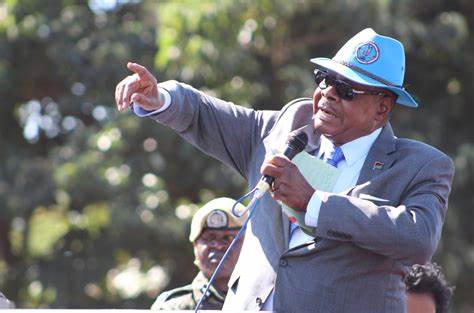As Malawi edges closer to the September elections, the conduct and rhetoric of political leaders are shaping not only the campaign trail but the expectations—and off course fears—of millions of Malawians.
The divide between the leadership styles of Democratic Progressive Party (DPP) President Arthur Peter Mutharika and incumbent President Lazarus McCarthy Chakwera has never been more telling.
Malawians are watching, analyzing, and reacting to two contrasting visions of leadership—one rooted in aggression and political brinkmanship, the other in cautious unity and institutional respect.
In the court of public opinion, former President Mutharika has appeared increasingly combative. His speeches, not only from his time as President but also those from his public appearances since he left office, reflect a man unwilling to accept political defeat without confrontation.
Also coming into the picture are disgruntled party officials like Norman Chisale, whose rhetoric frequently includes subtle calls to violence if the elections do not go the DPP way. Mutharika has allowed the DPP to slide into a posture of defiance. Rather than presenting a coherent policy agenda, the party appears fixated on grievances, conspiracy theories, and blatant threats.
In one video, Mutharika can be heard shouting, “We will not allow this country to be stolen again! We will take back what is ours by any means!” Such utterances, while rousing to his base, are loaded with implications. Political analysts warn that they suggest a willingness to incite post-election violence if the polls do not favor the DPP.
This is not unprecedented. In 2019, following a contentious election marred by irregularities, DPP supporters were involved in clashes across various districts. With that history fresh in mind, the current tenor of the DPP’s campaign strategy has alarmed many.
On the other hand, President Lazarus McCarthy Chakwera has adopted a tone more fitting of statesmanship. His campaign has focused on developmental policy, institutional reform, and electoral transparency. Amidst attacks from the opposition and sponsored civil society organisations, Chakwera has managed to project calm.
In a recent address to the Malawi Electoral Commission (MEC), Chakwera emphasized, “No victory is worth the blood of a Malawian. We are competitors, not enemies.” This type of rhetoric aligns with his image as a unifier and represents a call to all political actors to exercise restraint.
Indeed, while Mutharika rallies seem designed to inflame, Chakwera’s public engagements aim to reassure. The president has repeatedly met with civil society organizations, traditional leaders, and youth groups, calling for electoral peace and civic participation.
Compounding concerns about Mutharika’s temperament are recent revelations of opposition strategies allegedly discussed behind closed doors. DPP and its alliance partners reportedly plotting to orchestrate demonstrations, manipulating public sentiment through vendor-led protests, and undermining the credibility of the MEC.
Among the more alarming strategies is the idea to fund candlelight vigils from July to September “in memory” of the late Vice President Saulos Klaus Chilima, who died in a tragic plane crash in June 2024. While honoring Chilima is noble, politicizing his death for electoral mileage is an affront to both democratic norms and to the departed vice president.
Furthermore, the plan to force MEC Chairperson Anabel Ntalimanja to resign underlines a dangerous precedent. The reasoning, allegedly tied to her being the daughter of former MCP President John Tembo, is flimsy and inherently discriminatory. Rather than building trust in the electoral system, these actions seek to fracture it.
Historically, elections in Malawi have been fraught with tension, but rarely has the specter of orchestrated violence loomed so large. From funding mass protests to demanding unauthorized access to MEC systems, the DPP-led strategy appears less about contesting elections and more about delegitimizing them.
This sets the stage for post-election violence, particularly if the DPP loses. Should that happen, and if these warnings from Mutharika and Chisale continue unchecked, it is not far-fetched to foresee a situation similar to Kenya’s post-2007 election crisis or Zimbabwe’s disputed 2008 elections.
Both countries suffered international condemnation, loss of investor confidence, and internal displacement.
Ultimately, the divergent paths taken by Mutharika and Chakwera offer Malawians a profound choice: embrace the politics of division and retaliation, or pursue democratic resilience and institutional faith.
Chakwera’s leadership style during these tense months has remained largely within democratic norms. Mutharika, however, must be held accountable for fanning the flames of discontent without offering constructive alternatives.
In this volatile atmosphere, the role of civil society, religious institutions, and the media becomes paramount. They must act not as spectators but as referees, calling out dangerous rhetoric, fact-checking misinformation, and promoting civic education.
MEC must also remain steadfast and transparent. It is imperative that MEC publishes timely updates on voter registration, auditing, and ballot printing. Secrecy or delays could further fan conspiracy theories and heighten tensions.
For Malawi to emerge stronger from these elections, all parties must recommit to a peaceful process. The security forces must prepare for any potential unrest but remain neutral and professional.
The stakes are high. Malawi has a chance to show that democratic maturity is not only about free votes but about responsible conduct by those who seek power. The nation must reject the politics of chaos and violence, and choose a path grounded in dignity, law, and unity.
The world is watching. And history will not forget.








